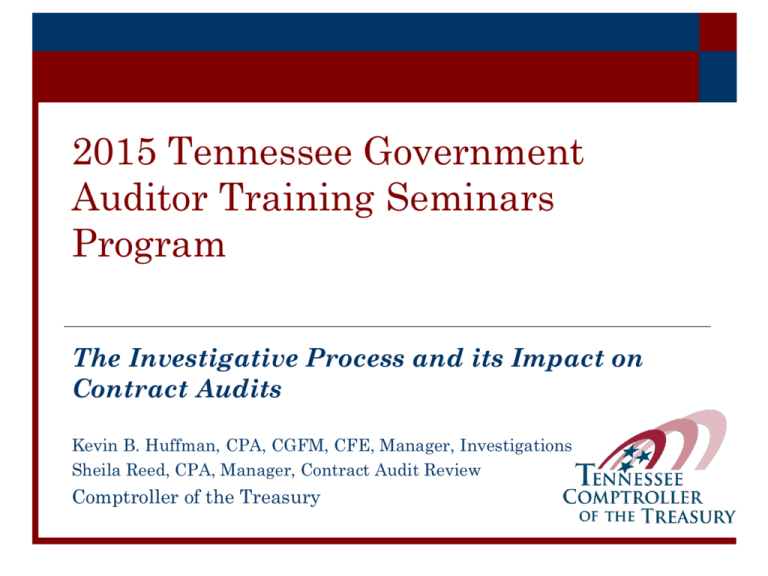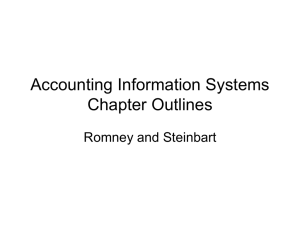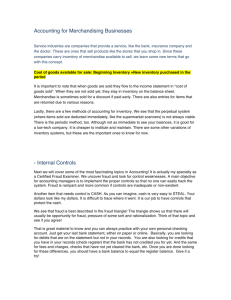
2015 Tennessee Government
Auditor Training Seminars
Program
The Investigative Process and its Impact on
Contract Audits
Kevin B. Huffman, CPA, CGFM, CFE, Manager, Investigations
Sheila Reed, CPA, Manager, Contract Audit Review
Comptroller of the Treasury
The Investigative Process and its Impact on Contract Audits
OUR MISSION
Investigate allegations of fraud, waste and
abuse in state and local governments and
other publicly-funded entities in the State
of Tennessee
2
The Investigative Process and its Impact on Contract Audits
HOW DO WE FIND OUT?
Comptroller’s hotline (phone and online
submissions), as well as local government
fraud reporting form notifications, intergovernment fraud notifications, fraud
notifications from local government
contracted CPAs, correspondence from
citizens and government officials
3
The Investigative Process and its Impact on Contract Audits
HOTLINE NOTIFICATIONS
In fiscal year 2014, the hotline received
1,629 notifications (1,522 calls and 107
online). Of the 1,629 notifications, 435
concerned allegations of fraud, waste, or
abuse of government funds.
4
The Investigative Process and its Impact on Contract Audits
OUR INTERNAL PROCESS
Weekly “triage” meeting
Facilitated and led by Office of General
Counsel
5
The Investigative Process and its Impact on Contract Audits
OUR INTERNAL PROCESS (cont.)
Attendees:
State and Local Government Audit
Local Government Audit’s contract audit
review
Special Investigations
Financial and Compliance Investigations
6
The Investigative Process and its Impact on Contract Audits
OUR INTERNAL PROCESS (cont.)
Weekly notifications are reviewed and
discussed…
Where does the notification fit – audit matter,
investigative matter, referral to other state
agency, etc…
7
The Investigative Process and its Impact on Contract Audits
OUR INTERNAL PROCESS (cont.)
Weekly notifications are reviewed and
discussed…
Notifications/allegations dealing with
governmental entities who receive audits
contracted thru Local Government Audit are
shared with review staff…
8
The Investigative Process and its Impact on Contract Audits
OUR INTERNAL PROCESS (cont.)
Weekly notifications are reviewed and
discussed…
Review staff forward information to CPA firm
for consideration/risk assessment on current
audit…
9
The Investigative Process and its Impact on Contract Audits
OUR INTERNAL PROCESS (cont.)
CPA communications regarding these
notifications/allegations are handled by Local
Government Audit Review staff…
10
Contract Audit Process
Notifications of Fraud, Waste and Abuse
and the Contract Audit Process
Objective:
Contract Auditor
Responsibilities
11
Notification Referrals to Contract CPAs
Total Notifications of Alleged Fraud, Waste
and/or Abuse Received by the Tennessee
Comptroller’s Office during fiscal year 2014:
435
Assigned notifications from Triage for referral
or follow-up with Contract Auditors during
fiscal year 2014:
12
Notification Referrals to Contract CPAs
Assigned notifications from Triage for referral or
follow-up with Contract Auditors during fiscal
year 2014:
Municipalities
Schools (Internal School Funds)
Utility Districts
E911 Districts
Quasi Governments
Housing Authorities
Not-for-Profit Agencies
County
13
Contract Auditor Communications to LGA
Notifications
reported to the
Comptroller’s
Office
Triage
LGA
Flow of Information
14
Contract
CPA Firms
Notification Referrals to Contract CPAs
The Communication
1. Confidential
2. Summary of the alleged fraud, waste or abuse
3. Request for response
4. Audit contract responsibility
5. Audit Standards
6. Fraud Reporting
– GAS ICC
– Schedule of cash shortages, thefts and fraud
15
Notification Referrals to Contract CPAs
16
Notification Referrals to Contract CPAs
Confidentiality Issues
•
Comptroller’s Fraud Hotline (1) toll-free telephone (2) electronic submissions
–
–
•
Submissions in compliance with the Local Government Instances of Fraud Reporting Act
–
–
•
Protected by TCA 10-7-504(a)(22)
“shall be treated as confidential and shall not be open for public inspection”
Investigative Working Papers – including interagency communications, draft reports,
schedules, notes, memoranda and all other reports related to an investigation.
–
–
17
Protected by TCA 8-4-505
“The detailed information received and generated pursuant to this part shall be considered confidential
working papers of the comptroller of the treasury and is therefore not an open record pursuant to title 10,
chapter 7.”
All information and records received or generated by the comptroller of the treasury
containing allegations of unlawful conduct of fraud, waste or abuse.
–
–
•
Protected by TCA 8-4-407
“The detailed information received and generated pursuant to this part shall be considered confidential
working papers of the comptroller of the treasury and is therefore not an open record pursuant to title 10,
chapter 7. “
Protected by TCA 10-7-504(a)(22)
“shall be treated as confidential and shall not be open for public inspection”
Notification Referrals to Contract CPAs
18
Notification Referrals to Contract CPAs
19
Notification Referrals to Contract CPAs
Paragraph 7 of the Uniform Contract to
Audit Accounts:
20
Notification Referrals to Contract CPAs
Request for
Response …
Written Summary of Audit Conclusions
21
Notification Referrals to Contract CPAs
Yellow Book
Generally Accepted Auditing
Standards
Audit working papers should
document that the allegations
were appropriately addressed
in accordance with applicable
auditing standards.
22
AU-C Section 240 of the U.S. Auditing
Standards – AICPA (Clarified) – June 1, 2014
(Consideration of Fraud in a Financial Statement Audit)
Considerations Specific to Governmental Entities and Not-for-Profit
Organizations
§240.A8 The auditor of governmental entities and not-for-profit
organizations may have additional responsibilities relating to fraud
• as a result of being engaged to conduct an audit in accordance with law
or regulation applicable to governmental entities and not-for-profit
organizations,
• because of a governmental audit organization's mandate, or
• because of the need to comply with Government Auditing Standards.
Consequently, the responsibilities of the auditor of governmental entities
and not-for-profit organizations may not be limited to consideration of risks
of material misstatement of the financial statements, but may also include a
broader responsibility to consider risks of fraud.
23
Source: © 2015 Thomson Reuters/Tax & Accounting. All Rights Reserved.
AU-C Section 240 of the U.S. Auditing
Standards – AICPA (Clarified) – June 1, 2014
(Consideration of Fraud in a Financial Statement Audit)
§240.A77 – Appendix B – Example Possible Procedures
“Specific responses to the auditor's assessment of the risks of material
misstatement due to fraud will vary depending upon the types or
combinations of fraud risk factors or conditions identified, and the
classes of transactions, account balances, disclosures, and assertions
they may affect.”
. . . “Differing circumstances would necessarily dictate different
responses. Ordinarily, the audit response to an assessed risk of
material misstatement due to fraud relating to misappropriation of
assets will be directed toward certain account balances and classes of
transactions. . . . the scope of the work is to be linked to the specific
information about the misappropriation risk that has been identified.”
24
Source: © 2015 Thomson Reuters/Tax & Accounting. All Rights Reserved.
Notification Referrals to Contract CPAs
Fraud Reporting
• GAS ICC
• Schedule of Cash Shortages
and Thefts
25
Yellow Book Options
Yellow Book
Auditor’s determination
of whether and how to
communicate such
instances to entity
officials is a matter of
professional judgment.
(GAS 4.26)
Instances of fraud
that “do not
warrant the
attention of those
charged with
governance.”
(GAS 4.26)
Report on I/C &
Compliance
Other
No
Communication
Verbally
26
Separate written
communication to
management
TN Audit Manual Impact
Yellow Book
Auditor’s determination
of whether and how to
communicate such
instances to entity
officials is a matter of
professional judgment.
(GAS 4.26)
Instances of fraud
that “do not
warrant the
attention of those
charged with
governance.”
(GAS 4.26)
Schedule of
Cash Shortages
& Other Thefts
(Audit Manual)
Report on I/C &
Compliance
Other
No
Communication
Verbally
27
Separate written
communication to
management
AU-C Section 240 of the U.S. Auditing
Standards – AICPA (Clarified) – June 1, 2014
(Consideration of Fraud in a Financial Statement Audit)
Considerations Specific to Governmental
Entities and Not-for-Profit Organizations
AU-C 240.A74 For governmental entities and
not-for-profit organizations, requirements for
reporting fraud, whether or not discovered
through the audit process, may be subject to
specific provisions of the audit mandate or
related law or regulation.
© 2014 Thomson Reuters/Tax & Accounting. All Rights Reserved. (Checkpoint)
28
AU-C Section 450 of the U.S. Auditing
Standards – AICPA (Clarified) – June 1, 2013
(Evaluation of Misstatements Identified During the Audit)
Considerations Specific to Governmental Entities
AU-C 450.A26 In the case of an audit of a governmental entity, the
evaluation of whether a misstatement is material also may be
affected by the auditor's responsibilities established by law or
regulation to report specific matters, including, for example, fraud.
.A27 Furthermore, issues such as public interest, accountability,
integrity, and ensuring effective legislative oversight, in particular,
may affect the assessment of whether an item is material by virtue
of its nature. This is particularly so for items that relate to
compliance with law or regulation.
© 2014 Thomson Reuters/Tax & Accounting. All Rights Reserved. (Checkpoint)
29
30







